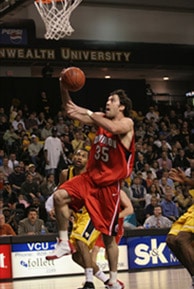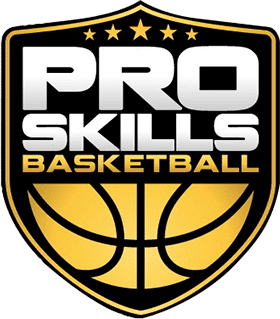
By Logan Kosmalski, PSB Co-Founder and former Davidson and pro player
When I look back on my basketball career—from early rec league games all the way to the professional level—I realize that my growth as a player had far less to do with natural talent than it did with mindset, resilience, and the ability to find meaning in the process. For younger players (and their parents or coaches), I want to share some of the most important lessons I learned—lessons about how improvement actually works, how to handle the emotional rollercoaster of competitive basketball, and what really sticks with you after the last whistle blows.
Improvement Isn’t Linear
When most players think about getting better at basketball, they picture a smooth, steady climb. Practice hard, and you’ll improve. Play more games, and you’ll see results. Simple, right?
Not quite.
Real improvement in basketball is anything but predictable. Yes, there’s a stretch early on—especially for beginners—where it feels like you’re improving every week. You learn how to dribble, then how to shoot, then how to make a layup, and suddenly you’re scoring in games. But eventually, progress slows. Plateaus happen. You might even feel like you’re going backward.
You’ll have seasons where you’re not the best player on the team, or you’re stuck on the bench behind older players. You may grow too quickly and lose coordination—or not grow at all and struggle against bigger opponents. Maybe you’re adjusting to a new coach, a tougher league, or even life stuff off the court.
It can be frustrating. It can make you question whether you’re “good enough.”
But those dips, plateaus, and obstacles are normal. Improvement isn’t a straight line—it’s a messy, unpredictable journey that requires patience, honesty, and a willingness to keep working even when results aren’t obvious.
One of my coaches used to say, “It’s a marathon, not a sprint.” He was right. The best players aren’t the ones who always had it easy—they’re the ones who stuck with it, adjusted, and kept showing up.
Managing the Emotional Rollercoaster
If you’ve played competitive basketball, you know the emotions can run high. One day you feel invincible after hitting a game-winner. The next, you’re devastated after missing free throws or getting benched.
That emotional up-and-down is part of the game—but it can take a toll.
As a younger player, I used to let my emotions control me. My confidence rose and fell with my stat line. If I played well, I was on top of the world. If I struggled, I was miserable. And I brought that energy into practice, into the locker room, even into my life outside of basketball.
But over time, I learned that the most successful and consistent players don’t ride those highs and lows. They stay grounded.
A player who helped me understand this better was Stephen Curry. Watching him day in and day out, I was struck by how balanced he remained. Whether he had 40 points or went 0-for-10 from three, he stayed focused, calm, and positive. That wasn’t just personality—it was intentional. It came from perspective, preparation, and maturity.
Finding that emotional balance is something every player can work on. It doesn’t mean you shouldn’t care. It means you learn to care productively—by using setbacks as motivation and learning to enjoy the process, not just the outcome.
Basketball will bring out frustration, disappointment, and even doubt. But if you learn to manage your emotions and keep a steady mindset, not only will you perform better—you’ll enjoy the game a whole lot more.
What Really Lasts: Relationships and Experiences
No matter how long you play basketball—whether it’s through middle school, high school, or even college or pro—the day will come when the games end. When they do, it’s not the stats you’ll remember. It’s the people, the moments, and the journey.
Some of my most cherished basketball memories have nothing to do with winning championships or scoring points. They’re about late-night bus rides, inside jokes with teammates, big practices where something finally clicked, and conversations with coaches who believed in me. They’re about the cities and countries I got to visit, the friendships that lasted beyond the court, and the lessons I didn’t even know I was learning at the time.
If I could go back, I wouldn’t change the mistakes I made or the games I lost. But I would try to appreciate those moments more while I was in them.
I spent too much time worrying about what scouts thought or stressing over my next performance. And while that drive helped me push through adversity, I often missed the joy right in front of me. I was so focused on getting to the next level that I forgot to enjoy the one I was in.
So if you’re a young player reading this, or a parent guiding your child through their journey, remember this:
Basketball is a game. It’s meant to be fun. Yes, it teaches hard work, discipline, and resilience—but it also brings laughter, joy, and connection.
Try to enjoy the teammates you have now. Appreciate the coaches who push you. Learn from your mistakes, but don’t obsess over them. Play for the love of the game—and let that guide you.
Final Thoughts: Redefining Success in Youth Basketball
At Pro Skills Basketball, we talk a lot about development over results. That’s not just a slogan. It’s a mindset that reshapes how we define success.
Success isn’t about being the best 5th grader in your city. It’s not about how many trophies you win or how many highlight clips you post. It’s about getting better—mentally, emotionally, and physically. It’s about learning how to be a good teammate, a resilient competitor, and a respectful student of the game.
And if you can do that, the wins will come—on and off the court.
(Note: This originally published in 7/27/24)



